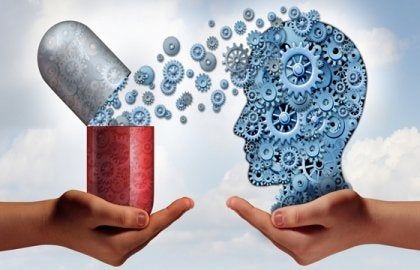Nootropics are compounds, medications, supplements, nutraceuticals, drugs or foods that seek to improve metabolic processes in the brain, especially the uptake of glucose and oxygen by the neuron, as well as better use of amino acids and electrolytes, with the The aim is to enhance functions such as cognition, memory, attention, concentration and orientation . Its name, derived from the Greek nous/mind – tropos/direction, indicates what is sought: to direct or support the mind for its best operation.
What are they used for?
They were developed with the geriatric population in mind to stop or slow down age-related cognitive decline (dementia, Parkinson's or Alzheimer's), although today there is doubt about their use in these cases, as they cause adverse reactions such as psychoaffective disorders in addition to those already present, bradycardia, orthostatic hypotension, anorexia and vomiting. Over time it was discovered that nootropin had useful effects for the control of mild epilepsy and other medications with the same function have been developed from it. Today its use is also being tested in the treatment of other pathologies that affect cognitive performance such as Attention Deficit Syndrome, Bournout Syndrome, acute stress or depression, but without positive results so far.

Who can take them?
Although they are relatively safe medications, they are fairly recent (their studies began in the 1980s) and there is still no certainty about their real effects or long-term side effects. It is known that their abuse can generate a certain degree of toxicity that affects the central nervous system and cases of psychomotor function problems have been reported, with tremors and difficulty with motor control, but there is a lack of relevant studies that provide certainty about their safety or precautions that should be taken. Their use is not recommended for people with psychosis, dementia due to neurological causes, pregnancy, kidney or liver failure. Nootropics should always be prescribed by a doctor and there should be permanent monitoring to monitor the person's progress and tolerance to them.

So is there a brain “drug” that actually boosts our capabilities?
The quick answer is no, but there are some substances that have shown slight improvements in healthy people, and some are more common than they seem:
Caffeine : Caffeine doses of 40-300 mg per day increase alertness and reduce reaction time. They also increase physical capacity for effort, but do not improve decision making.
Creatine : Found in red meat and as a supplement for gaining muscle, it also has positive effects such as improvements in memory and logical ability.
Nicotine : It is an effective stimulant that temporarily increases attention, memory and the ability to concentrate… the first few times.
Piracetam : belongs to a family of nootropics called racetams, and is used to treat age-related cognitive decline by increasing the fluidity of neuron membranes. However, studies that found positive effects in healthy people are old.
Noopept : Supposed to improve memory and learning in people at risk of cognitive decline. As above, the benefits of its use in healthy people are anecdotal. It is supposed to stimulate cell proliferation of neurons, but this has recently been disproven.
Elvanse, Aderall : These are amphetamines and are administered to treat attention deficit hyperactivity disorder (ADHD) in children and adults, but some people use them to perform better at work or school. In healthy people, they produce a state of “hyperfocus” that allows you to maintain concentration on a task… The problem? They cause addiction, limit creativity and decrease libido.
Rubifen, Ritalin, Concerta : These are methylphenidate, which is not an amphetamine but has similar effects and is used to treat ADHD. Instead of increasing dopamine and norepinephrine levels, it prevents them from falling. Taking it without a prescription has been associated with anxiety and sleep disorders.
Modafinil: a drug for the treatment of narcolepsy. It has a similar effect to amphetamines, but a much lower risk of addiction. It works in healthy people by helping to maintain mental capacity for hours and reducing fatigue. Unlike amphetamines, it does not affect creativity.

In short, the nootropics or “smart drugs” that have the most powerful effects are those that require a prescription, and in most cases have significant side effects. Vitamin, mineral and antioxidant supplements have much more subtle effects, which come from covering some deficiency in our diet.
Natural nootropics
Natural nootropics are designed to improve cognitive ability. They contain only natural ingredients that allow for improved mental performance, energy, and focus. Some of the ingredients classified as nootropics are:
Matcha Green Tea . Green tea reduced to a superfine powder containing nootropic components such as Theanine.
Guarana seeds . They can affect the brain, making you feel less tired and more alert.
Choline . Present in broccoli, it plays a key role in regulating cognitive processes, mood and intelligence.
Ginkgo Biloba : A very popular supplement used by many to enhance mental activity.
Panax Ginseng - It has a reputation for stimulating brain function and increasing energy levels.
L-Carnitine . Found in asparagus, it is a mitochondrial energy optimizer that boosts energy production at the cellular level.
L-Tyrosine . Found in avocados, it is necessary for the production of dopamine, which influences mood, motivation and performance.
Vitamins and minerals. They provide an improvement in cognitive ability and energy levels. These are: Magnesium, Zinc, Iron, Iodine and Vitamins A, E, C, D2, B1, B2, B3, B5, B6, B7, B9, B12.

6 foods that improve brain function
Egg. In addition to its protein content, B vitamins and quality fats, it contains an interesting nutrient for brain function: choline. It is a precursor of acetylcholine, a neurohormone that seems to protect against degenerative brain diseases, such as senile dementia and Alzheimer's disease.
Walnuts . They are rich in omega 3 and omega 6 fatty acids, which help prevent cognitive decline and promote learning. They also contain vitamins and minerals such as vitamin E, magnesium, polyphenols and vitamin B6, which generally benefit memory and concentration.
Cocoa : Stimulates intellectual performance due to its content of flavonoids, which are powerful brain antioxidants, although it must be present in high concentrations (greater than 70%) since the antioxidant and stimulating effect will only apply to pure chocolates with a high cocoa content.
Broccoli and green leafy vegetables . They have a high concentration of antioxidants, carotenoids, minerals, and vitamin K, known for its blood clotting function and also for its positive effects on Alzheimer's.
Blueberries . They promote concentration, protect the brain from free radicals and improve long-term memory due to their content of antioxidant vitamins such as flavonoids. They have potassium that contributes to the transmission and generation of neurotransmitters, helping to reduce cognitive decline and memory loss.
Banana . Its high tryptophan content, along with potassium, magnesium and vitamin C, give bananas a high antioxidant potential that can be very useful when it comes to reducing and managing stress.





Comments (0)
There are no comments for this article. Be the first one to leave a message!